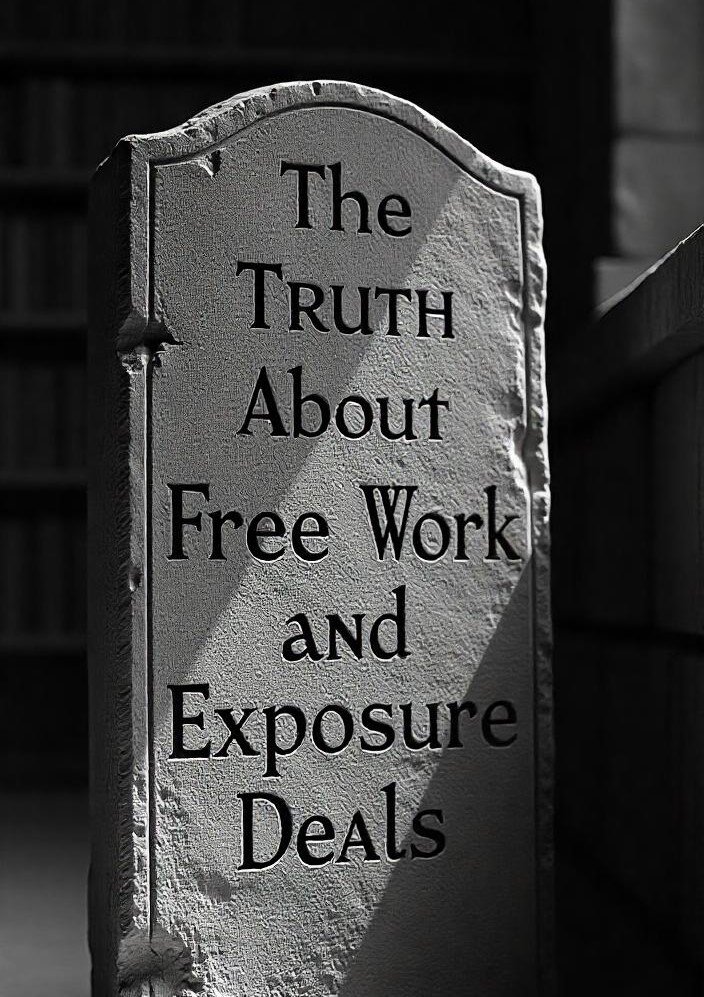The Harsh Truth About Free Work and Exposure Deals: Why You Should Think Twice
In the world of freelancing and creative industries, exposure deals have become a common but controversial topic. You’ve probably heard it all before: “We can’t pay you right now, but this project will give you great exposure!” Or, “This could lead to bigger opportunities down the line!” The promise sounds tempting, right?
But here’s the harsh truth about free work and exposure deals: they rarely lead to anything tangible.
It’s time to stop romanticizing exposure and start recognizing it for what it truly is—a trap. Let’s break down why offering your work for free or in exchange for “exposure” can hurt your creative career, and what you can do instead.
Why Exposure Deals Aren’t the Golden Ticket
1. Exposure Doesn’t Pay Bills
At the end of the day, exposure doesn’t help pay your rent, buy groceries, or cover your utilities. While exposure might offer visibility, it doesn’t offer stability. As a creator, your time and talent are valuable. Instead of working for free in exchange for “future opportunities,” you should be looking for ways to get compensated for your skills right now.
Many creatives fall into the trap of taking exposure deals because they believe that it will eventually lead to bigger clients or paid gigs. But the harsh reality is that exposure is often just a hollow promise that leads to more free work without any substantial payoff.
2. You Lose Control Over Your Work
When you agree to do work for free, you give up some control over how your work is used. Exposure deals typically don’t come with terms that protect your rights as a creator. You may not have a say in how your work is showcased, how it’s credited, or even if it’s used in a way that aligns with your brand.
By giving your work away for free, you’re also giving away ownership, which can be detrimental in the long run. Rather than seeking exposure, you should be focused on retaining ownership of your work and negotiating fair compensation for it.
3. Exposure Deals Often Exploit Creators
The biggest issue with exposure deals is that they exploit the very people they claim to support. Many businesses and individuals know that emerging creatives are eager to get their foot in the door, and they use that eagerness to take advantage of free labor. They promise exposure in exchange for work, but when it’s time for payment or even a follow-up gig, they often disappear.
This pattern can leave you with a portfolio full of projects that didn’t pay you and a reputation as someone who works for free. Instead of building a career, you’ll be stuck in an endless loop of unpaid work that doesn’t help you grow or build a sustainable income.
4. It Undermines the Value of Your Work
When you agree to work for free or for “exposure,” you’re essentially saying that your work doesn’t have value in monetary terms. This can harm your reputation and make it harder for you to raise your rates in the future. Clients will start to view you as someone who’s willing to accept anything, and they’ll likely continue offering you low-paying gigs or exposure deals, undermining your professional worth.
If you want to position yourself as a serious professional, it’s crucial to treat your work with the respect it deserves. Charge for your services. Be clear about the value you bring to the table. When you stop accepting free work, you send a strong message that your skills are worth something, and others will start to value you accordingly.
How to Avoid Falling Into the Exposure Trap
1. Create a Pricing Structure
One of the best ways to protect yourself from exposure deals is to have a clear pricing structure in place. Know your worth and establish a rate that reflects the value you provide to clients. If someone offers you a project with the promise of exposure, be prepared to walk away if it doesn’t meet your price or terms.
Set boundaries around your work, and don’t be afraid to turn down opportunities that don’t align with your goals or pay you fairly. If you’ve been working for free, this is the moment to start taking your work seriously and treating it like a business.
2. Offer Value-Driven Content
Instead of working for free, focus on creating value-driven content that showcases your skills and attracts clients who are willing to pay for them. Share your work on platforms like Instagram, LinkedIn, or a personal website, where your potential clients can see what you’re capable of.
This approach helps you build your brand and reputation without the need for exploitation. It allows you to attract clients who understand the value of your work and are willing to pay for it.
3. Look for Paid Opportunities
There are plenty of paid opportunities available for creatives, even if you’re just starting out. While it may take time to build a client base, there are countless platforms and networks that connect freelancers with clients who need quality work at fair prices.
For example, platforms like Upwork, Fiverr, or even local networking events can offer you the chance to connect with clients willing to pay for your expertise. Start by targeting small businesses or individuals who value your work and are willing to invest in your services.
Conclusion: Stop Selling Yourself Short
The truth is, freelancing and creative work are not about taking whatever comes your way. They’re about building a reputation, setting boundaries, and positioning yourself as someone who brings real value to the table. Exposure deals might seem tempting, but they rarely lead to sustainable income or growth.
Instead of working for free, focus on building a business that respects your work and pays you fairly for it. When you stop relying on the false promise of exposure, you open up opportunities for paid work that supports your long-term goals and growth.
So, next time someone offers you an “exposure deal,” remember this: You don’t need more exposure. You need fair compensation for your work. Your skills are valuable—treat them as such.






